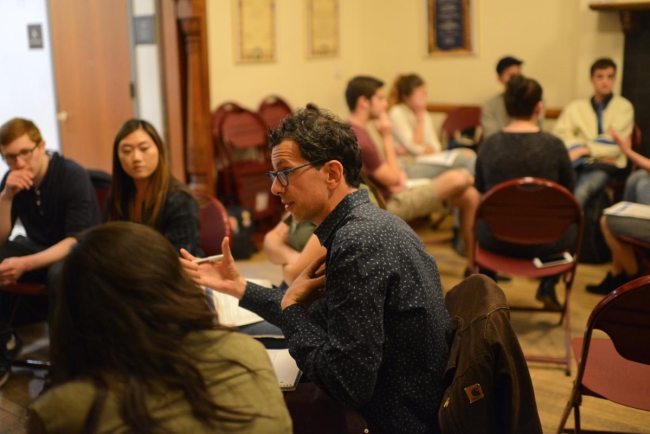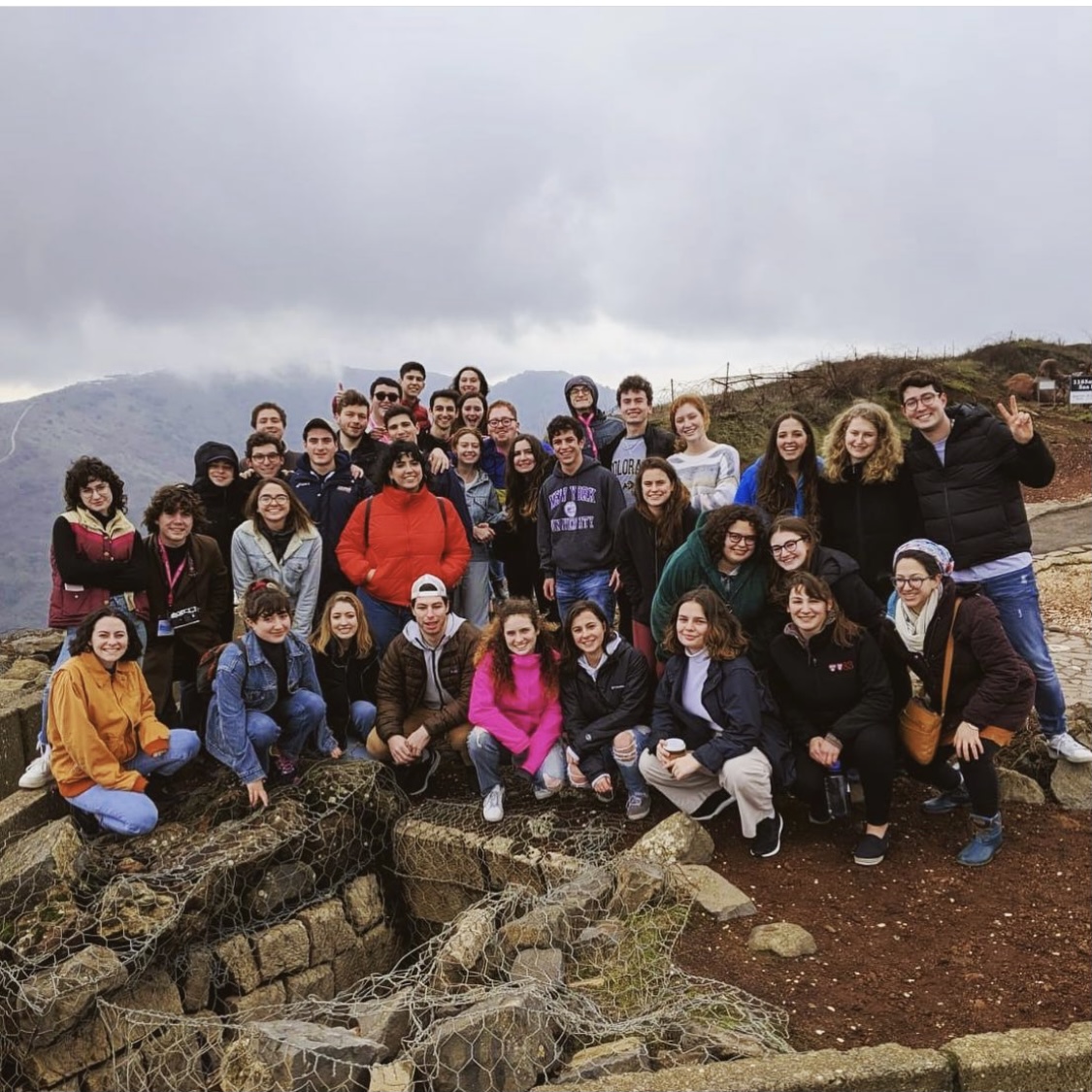You have /5 articles left.
Sign up for a free account or log in.

Resetting the Table sends representatives to Hillels to work with Jewish students experiencing frictions over differences in political perspectives or religious views.
Gili Getz
Elyza Veta, a recent graduate of New York University, was excited to go on a group trip to Israel in the middle of her sophomore year in 2020. The trip was sponsored by Birthright, a program that takes Jewish students and young professionals on free tours of Israel with the goal of promoting and strengthening their Jewish identity and their ties to Israel.
But things got off to a rocky start—the students got into heated debates about the Israeli-Palestinian conflict.
“It was sort of this looming thing throughout the whole trip,” Veta said. “And everyone sort of retreated to the people they knew agreed with them. You have all the anti-Zionists whispering in one corner, the Zionists whispering in another corner … The conversations were just breaking down at that point, and no one was talking about it in ways that were productive.”
Veta and a friend also on the trip decided they had to do something. Both had previously interned at an organization called Resetting the Table, which sends representatives to Hillels, centers of Jewish life on college campuses, to work with Jewish students experiencing frictions over differences in political perspectives or religious views, or to stave off possible tensions. Veta and her friend decided to hold a “dual narratives” workshop for their peers. The workshop was designed by the organization to teach politically diverse Jewish students techniques to discuss and empathize with multiple sides of the conflict. Veta said the tone of the trip shifted as a result.
“Everyone sort of felt this huge weight was lifted off their shoulders and off their chests,” she said. “The fact that we were all able to sit through this program, to understand where everybody was coming from and sort of be on the same page … No question that by the end of that, everybody came out more empathetic to the people they disagreed with.”
 As tensions between Zionist and Palestinian student groups simmer at colleges across the country and rival protests erupt on campuses, Jewish students and employees involved in Hillel programs say there are also deep fissures on the Israeli-Palestinian conflict among Jewish students themselves, which leave some of them feeling alienated and obstruct productive dialogue on campuses at large.
As tensions between Zionist and Palestinian student groups simmer at colleges across the country and rival protests erupt on campuses, Jewish students and employees involved in Hillel programs say there are also deep fissures on the Israeli-Palestinian conflict among Jewish students themselves, which leave some of them feeling alienated and obstruct productive dialogue on campuses at large.
Resetting the Table, which was founded to confront these problems, is helping Jewish college students navigate these rocky terrains. The organization, launched in 2014, also teaches dialogue skills at religious congregations and other settings. Its workshop exploring different Israeli and Palestinian narratives is especially popular.
Rabbi Melissa Weintraub, co-founding executive director of the organization, noted that Jewish students belong to various clubs on campuses focused on the Israeli-Palestinian conflict, ranging from Israel advocacy organizations to Palestinian rights groups, while others have feelings and opinions on the issue but don’t share them for fear of getting involved in the fray.
The goal isn’t to eliminate “profound differences” among students but to demonstrate that “people are writing each other off,” including people “that they can reach and engage in the right conditions with the right tools,” said Weintraub, who is also the former founding director of Encounter, an organization intended to expose Jewish leaders to diverse perspectives on the conflict. “We’re living in a cultural moment in which many of us are drawing our red lines too close to ourselves … It’s easy to see other people as beyond the pale and not worth speaking to before we’ve really tried.”
The organization works with the full spectrum of students. It also has politically diverse funders, including the Jim Joseph Foundation, which funds Jewish education programming; the Jacob and Hilda Blaustein Foundation, focused on social justice issues and building a more “pluralistic” Israeli society; and Maccabee Task Force, an Israel advocacy organization supported by the late conservative philanthropist Sheldon Adelson.
Kenneth Stern, who directs the Bard University Center for the Study of Hate, said Jewish students, and American Jews in general, are divided. Some see Israel as a historic safe haven for Jewish refugees and a critical part of their cultural or religious identities, while others see the government’s treatment of Palestinians as counter to their Jewish values. Stern wrote a book called The Conflict Over the Conflict (New Jewish Press, 2020), which explores why campus debates about the Israeli-Palestinian conflict are so contentious.
“When your identity is tethered to an issue of perceived social justice or injustice, it becomes very, very powerful,” he said. “You try to reject the complexities. You try to reject the idea that there’s any justice on another side. You certainly don’t crave the emotional capacity to imagine if you were born into a different circumstance would you have felt differently. You get sort of poised to have the moral certainty that you’re right and jump into the fight.”
Training the Trainers
According to Weintraub, students aren’t the only ones who need coaching through these thorny issues. Resetting the Table has always worked with Hillel houses and Hillel International, their overarching organization, but it recently expanded its partnership with Hillel to include a new “train the trainers” program.
Over the course of six months, a dozen Hillel staff members learned to run dialogue workshops on their campuses. Starting next fall, Weintraub also plans to run shorter programs or “boot camps” for Hillel staff members followed by longer program opportunities.
“Every campus professional needs to be able to navigate political division and needs some tools and skill building," she said.
Matthew Vogel, executive director of University of Vermont Hillel, said he previously wrestled with how to meaningfully engage with students about the Israeli-Palestinian conflict. The issue felt too fraught to him, especially on a campus where “the vast majority of students are really engaged in social justice,” which can cause some Jewish students involved in campus activism to feel wary of discussing Israel for fear of alienating their peers. He ended up avoiding the complexities of the topic altogether.
“I really felt like I sometimes struggled with the right language of how to talk about Israel on campus with also being inclusive to every single Jewish student who might want to walk in the door or engage with Hillel or engage with their Jewish identity,” he said. “So, in some ways, I didn’t say a lot, and I kept a lot of our programs more surface level.”
Vogel, who now runs Resetting the Table programs with both students and staff members, appreciated that the workshops “presented multiple narratives and let students compare their own perspectives and make up their own mind and their own relationship to a vastly complex issue.”
Naomi Fainchtein, an assistant director of American University Hillel who participated in the new training program for Hillel staff, said she was drawn to the opportunity at a time when religious and political divisions in general feel especially stark on her campus and nationwide.
“We live in incredibly polarizing times, and college campuses tend to be at the forefront of some of that polarization,” she said.
The intracommunal debates Hillel staff members are confronting are hardly new. For example, in 2013 a Jewish student movement called Open Hillel emerged to protest restrictions that outline which speakers and groups Hillel International will partner with to put on events. Those restrictions include not partnering with groups that support a boycott of Israeli businesses; that “deny the right of Israel to exist as a Jewish and democratic state with secure and recognized borders”; that “delegitimize, demonize, or apply a double standard to Israel”; or that “exhibit a pattern of disruptive behavior towards campus events or guest speakers or foster an atmosphere of incivility.” Open Hillel activists argued these standards were too restrictive to represent the full diversity of Jewish students’ views on the conflict.
Adina Danzig Epelman, vice president for engagement and impact at Hillel International, noted that Hillel’s partnership standards also include a commitment to “facilitate civil discourse about Israel in a safe and supportive college environment that is fertile for dialogue and learning” and allow individual Hillel houses to establish their own guidelines.
“Hillel has always been and continues to be committed to first welcoming all students regardless of point of view and ensuring that they feel included and a sense of belonging and that Hillel is a place they can express themselves as their whole selves,” she said.
She sees Hillel’s collaboration with Resetting the Table as a separate issue.
“Our Hillel professionals are saying again and again that this is the essential training they need to do the work in today’s world,” she said. “It provides them with skills and confidence to help students have conversations across difference in a way that’s respectful and builds relationships, which is increasingly important, because we’re living in a time when the political climate on campus is driving students with different worldviews into separate and sometimes warring enclaves.”
‘Peace Building’ On and Off Campus
The alternative to productive dialogue is students shutting down and “melting like ice cubes” when they hear contrary opinions on Israel in classrooms or bristling during Shabbat dinners that turn into heated political debates instead of engaging in challenging but potentially meaningful conversations, said Jenna Citron Schwab, executive director of Queens College Hillel.
When this happens, “what they can’t do is actually talk about their own relationship to Israel as a Jewish person,” she said. After introducing regular dialogue trainings for Jewish student leaders about a decade ago, she’s noticed more students “have the tools for being able to hear hard things and then also be able to share their own story without feeling like they need to be defensive or stand up for something.”
She wants students to feel more at ease discussing Israel with each other and also with non-Jewish peers, especially on a campus such as Queens College, whose student body is racially, ethnically and religiously diverse. She doesn’t want students to miss out on the educational benefits of engaging with that pluralism.
“There’s a lot of differences on our campus,” she said. But “diversity doesn’t mean you ever engage with the diversity. It just means it’s diverse. When they walk past their peers on the quad, who look or speak or eat or pray differently than they do, do they feel comfortable and have the tools to engage with them in a meaningful way?”
Weintraub believes her organization’s workshops are about more than defusing tensions within Jewish campus communities but a step toward broader “peace building.”
“Without creating a different kind of argument and without creating an opportunity for people to push and challenge each other across their silos and echo chambers, we wouldn’t amass the intelligence and wisdom and creativity that we need to solve problems.”





